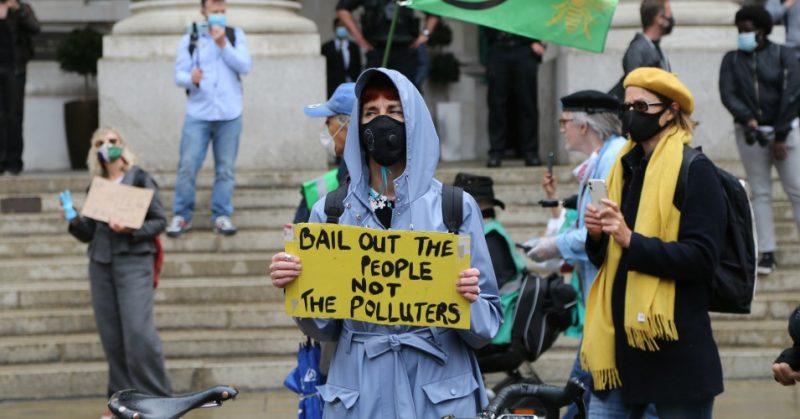“To continue to throw money at an industry that is not only causing environmental destruction but also facing economic decline is as imprudent as it is indefensible.”

Jake Johnson, staff writer for Common Dreams
Recent efforts by oil and gas giants to project an outward appearance of financial stability amid the Covid-19 pandemic by selling off assets or accumulating debt to continue paying out steady shareholder dividends represent strong evidence that the fossil fuel industry has reached its “endgame” and should not be bailed out with taxpayer dollars.
That’s according to a new report released Thursday by the Center for International Environmental Law (CIEL), a policy research and advocacy group based in Washington, D.C.
“The game is up. Oil and gas companies can no longer mask their financial frailty.”
—Nikki Reisch, Center for International Environmental Law
The report says the coronavirus pandemic—which has thrown oil markets into turmoil by causing a collapse in demand—has “forced the industry to reckon with the fundamental unsustainability of oil and gas company finances and exposed the steady decline behind the industry’s steady dividends.”
Major fossil fuel corporations such as ExxonMobil and BP, the report notes, “are racking up debt to maintain their shareholder payments and sustain their image as sound investments.”
“Oil and gas companies are also writing down and selling off their assets at heavily discounted prices, in a move that reflects a desperate need for cash and growing skepticism about the future value of fossil fuels,” the report adds.
Last week, as Nicholas Kusnetz of Inside Climate News reported, BP and Royal Dutch Shell announced plans to slash the value of their oil and gas assets by $22 billion and $17.5 billion, respectively.
“Both companies said the accounting moves were a response not only to the coronavirus-driven recession, but also to global efforts to tackle climate change,” Kusnetz noted. “Some analysts say the global oil and gas industry is undergoing a fundamental transformation and is finally being forced to reckon with a future of dwindling demand for its products.”
Nikki Reisch, director of CIEL’s Climate and Energy Program and co-author of the new report, said in a statement that the combination of mounting debts and asset sell-offs show the fossil fuel industry “knows its future prospects are grim; so, too, should investors and policymakers.”
“The game is up,” said Reisch. “Oil and gas companies can no longer mask their financial frailty.”
In addition to discouraging continued private investment in the oil and gas industry, the report urges public policymakers to stop propping up struggling fossil fuel companies with taxpayer money.
“Policymakers have a duty to the public whose taxes they spend,” the report says. “Both should heed the warnings and steer clear of funding an industry facing economic decline and fueling environmental disaster.”
CIEL senior attorney said Steven Feit “it’s past time to recognize this industry is beyond recovery.”
“The writing has been on the wall for a long time now, and the pandemic has made the signs that much more stark—investors should stay away from fossil fuel companies and policymakers must stop bailing them out,” said Feit. “To continue to throw money at an industry that is not only causing environmental destruction but also facing economic decline is as imprudent as it is indefensible.”